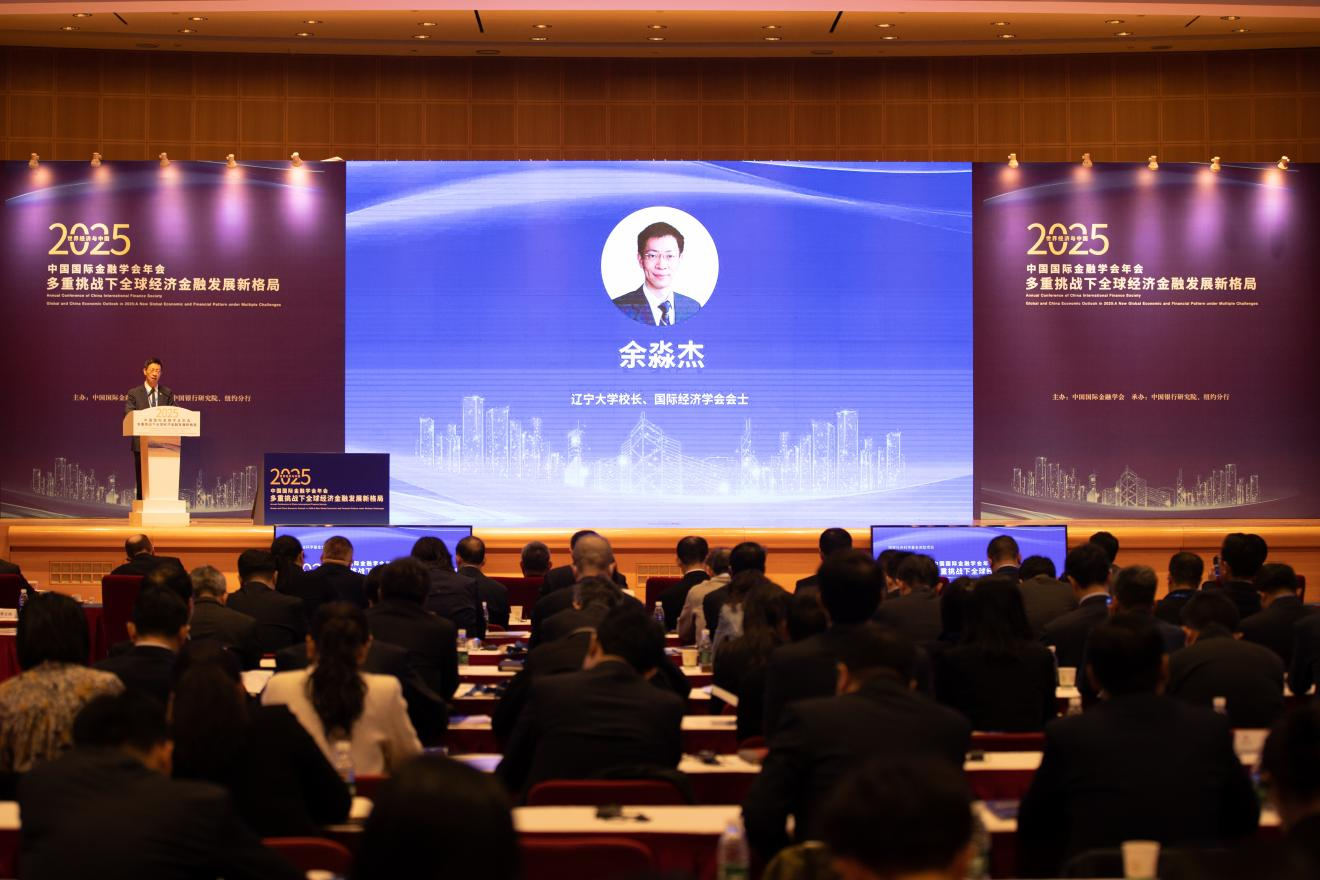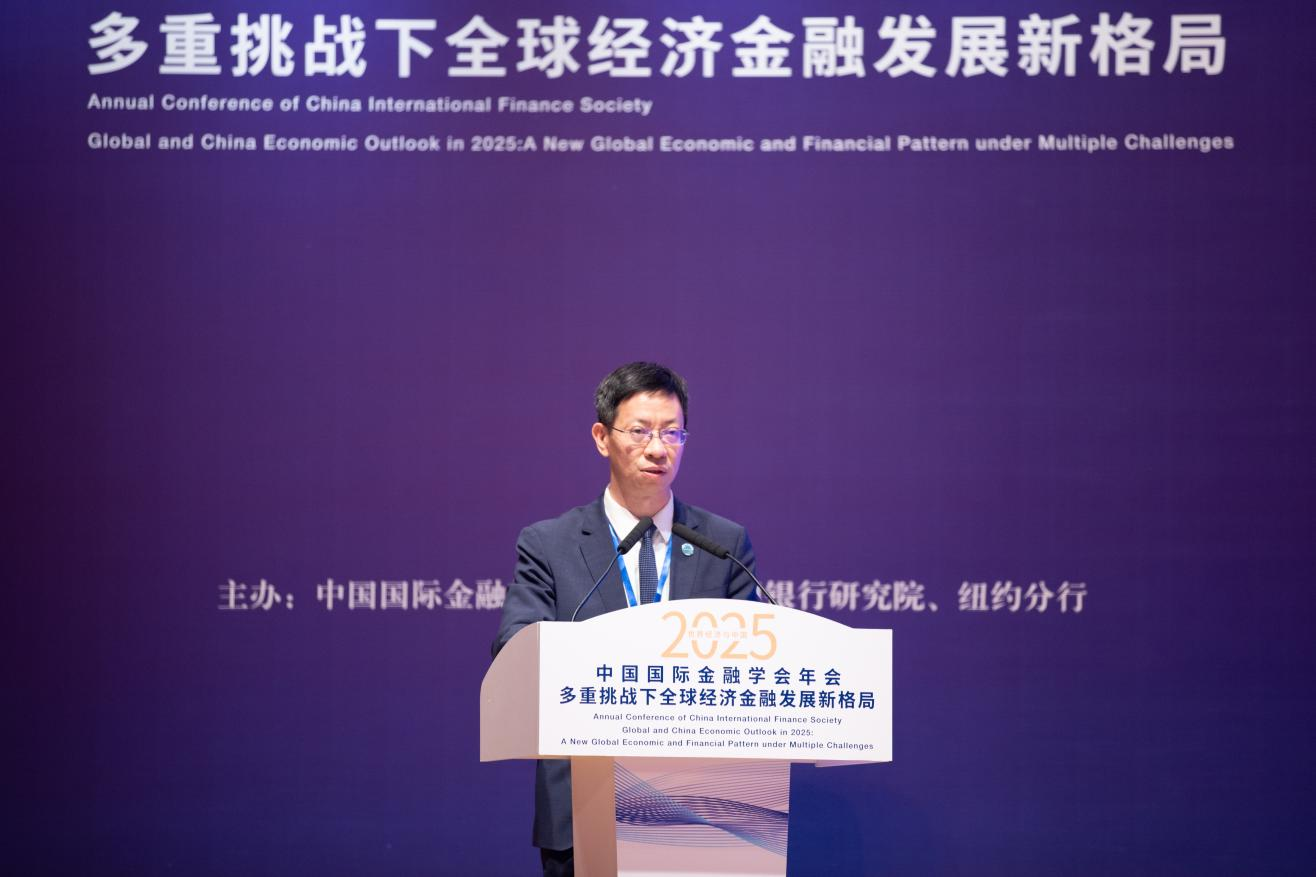On November 8, 2024, the Annual Conference of China International Finance Society, themed "Global and China Economic Outlook in 2025: A New Global Economic and Financial Pattern under Multiple Challenges", was held at the headquarters of the Bank of China in Beijing. The conference was organized by the China International Finance Society, with the Bank of China Research Institute and the New York Branch as co-organizers. The meeting was chaired by Professor Liang Qi, Vice President of China International Finance Society and Deputy Secretary of the Party Committee of Nankai University. Ge Haijiao, President of China International Finance Society, Chairman of the Bank of China, and Member of the International Advisory Committee of the Monetary Authority of Singapore, delivered the opening remarks. Professor Yu Miaojie, Fellow of the International Economic Association, Deputy Secretary of the Party Committee and President of Liaoning University, and a deputy to the 14th National People's Congress, gave a keynote speech.

Professor Yu Miaojie pointed out that, in the face of the challenges of population aging and the rising forces of deglobalization, under the strong leadership of the Party Central Committee, particularly with the introduction of a series of reform measures by the Third Plenary Session of the 20th Central Committee of the Party, the Chinese economy has clearly entered a new development stage of high-quality economic growth. The opportunities outweigh the challenges, and there is ample reason to be confident in the Chinese economy.

Professor Yu Miaojie conducted a focused analysis from the following five aspects: First, innovation as the primary driver. The eight strategic emerging industries, including artificial intelligence, information technology, new materials, new energy, high-end equipment, biomedicine, aerospace, and quantum technology, should focus on independent R&D innovation from "zero to one", while other industries should emphasize technological improvement and deepening innovation, moving from "one to N". Cultivating new forms of productive forces requires three major efforts: innovative allocation of production factors, deep transformation and upgrading of industries, and revolutionary breakthroughs in science and technology. Continuous promotion of innovation in rules, regulations, standards, and management is essential. Second, green as a common form. Emphasis should be placed on increasing the proportion of non-fossil energy in primary energy consumption, promoting integrated "one-stop" development of wind, solar, coal, nuclear, and storage energy, particularly the development of transportation and energy storage industries. The so-called "overcapacity" exists due to insufficient effective demand and excessive supply, which is not unique to China. Industrial subsidies are not exclusive to China; subsidies for industrial policies that benefit innovation and green development do not violate WTO rules. Third, coordination as an inherent characteristic. Efforts should be made to advance regional, urban-rural, and industry coordination, building a unified domestic market that ensures the unification of factor markets and product services, especially achieving the "three same" goals for products, ensuring the same quality, same production line, and same standards for both domestic and foreign trade. Key measures include reducing tangible logistics costs and intangible transaction costs to improve the business environment. Fourth, openness as the only way forward. A new pattern of comprehensive openness with "larger scale, broader scope, and deeper levels" should be established. Expand service trade and intermediate goods exports, promote online and green trade, and accelerate the transition from factor-driven openness to institutional openness based on rules and systems. The new pattern of openness can be advanced in six areas: diversification of export destinations, expansion of import scale, simultaneous expansion of intermediate goods imports and domestic production, addressing the shortcomings in service trade, facilitating enterprises to "go global, integrate, and ascend", attracting foreign investment, and achieving high-quality and differentiated development in the Belt and Road Initiative, as well as promoting the internationalization of the Chinese currency. Fifth, shared prosperity as the ultimate goal. Efforts should be made to reform the WTO, reactivate the dispute resolution mechanism, with the focus of reform not on multilateralization but on plurilateralization.
Yang Weimin, Deputy Director of the Economic Committee of the 13th National Committee of the Chinese People's Political Consultative Conference; Zhu Min, Member of the Academic Committee of the China International Finance Society and Senior Expert at the China Center for International Economic Exchanges; Li Yang, Member of the Academic Committee of the China International Finance Society and Director of the National Institute of Financial Research and Development; Gerard Lyons, Senior Independent Director of Bank of China (UK) Limited and former Chief Economist of Standard Chartered Bank; Jeffrey Sachs, Professor at Columbia University; Yu Yongding, Member of the Chinese Academy of Social Sciences, and over 200 guests from domestic and international universities, think tanks, financial institutions, and news media organizations attended the event.